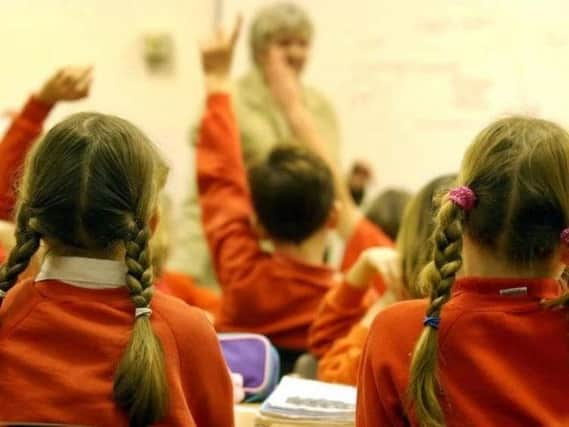Education union criticises government plan to lift Covid restrictions in schools


Education Secretary Gavin Williamson announced this afternoon that the use of bubbles in schools is among restrictions that will come to an end.
He outlined the changes in a statement to MPs - which follow Prime Minister Boris Johnson' s announcement yesterday that 'Freedom Day' on July 19 is expected to go ahead as planned.
Advertisement
Hide AdAdvertisement
Hide AdKey restrictions on education and childcare will come to an end in step 4 of England's roadmap out of lockdown, Mr Williamson said.
Class bubbles will end on July 19, and NHS Test and Trace will now handle notification of Covid outbreaks in schools.
It will not be necessary to stagger start and finish times for schools and colleges - although they can continue doing this until the end of summer term if they wish.
From August 16, those under the age of 18 will no longer have to self-isolate if they are contacted by NHS Test and Trace as having been near to someone with coronavirus. Instead they will be advised to take a PCR test.
Advertisement
Hide AdAdvertisement
Hide AdThere will also be no restrictions on in-person teaching and learning in universities unless students are advised to isolate or are affected by local outbreaks.
Commenting on the announcement, Dr Mary Bousted, joint general secretary of the National Education Union, said: "Schools and colleges are doing everything they can to keep young people and the wider community safe. We must seriously question the wisdom of the Government's decision to take away so many safety measures.
"These mitigations are being removed at a time when cases are rising, school outbreaks are at the highest level all year and rising sharply, and children remain unvaccinated and at risk of transmitting the virus and suffering Long Covid themselves.
"The Government should publish the results of its trials on daily contact testing as an alternative to self-isolation before changing the system. It should also provide support to schools to organise testing in the autumn term, not leave this burden on already overstretched school and college staff. It would be eminently sensible to bring in Public Health England to organise this work.
Advertisement
Hide AdAdvertisement
Hide Ad"Measures to maintain and improve ventilation by providing air filters and CO2 monitors could be quickly and easily introduced but have instead been ignored. Other simple safety measures such as wearing face masks when moving around the school have been ignored as well.
"The Government must also respond to the crisis of Long Covid by confirming that it recognises the condition as a disability and provide support to those employees affected by Long Covid.
"Gavin Williamson has asked school and college leaders to be patient in their wait for guidance, but it is simply not good enough to leave so much unresolved when so little of the summer term remains.
"The education secretary promised heads full clarity the moment step 4 of the roadmap was reached, so there will be considerable anger and concern if he does not make good on his word.
Advertisement
Hide AdAdvertisement
Hide Ad"This is not a Government which oversees, but one which overlooks. It has failed to take account of the alarming deterioration in self-testing numbers among school-age children, dropping from 60% in mid-March to just 15% today.
"The decision to remove requirements for masks in secondary classrooms from mid-May has led to a significant rise in cases of which Government appears oblivious.
"This is neglectful and reckless decision-making, when schools and colleges quite obviously need the backing of Government to ensure their workplace remains safe.
"The NEU has always said that we should hope for the best but plan for the worst, and base decisions on the science and the data. The Government appears to have no concern for other eventualities, pinning everything on hope.
Advertisement
Hide AdAdvertisement
Hide Ad"Schools and colleges have been through this several times before and leaders will be appalled that yet again so little is being done to support them."
Last week, Lancaster & Morecambe NEU secretary Sam Ud-din said that funding across the board was needed to support schools as part of the Covid recovery process.
And the NEU praised Lancaster City Council for passing a motion aimed at lobbying the government to scale up its ambitions for young people by providing the resources needed.
The motion, proposed by Coun Faye Penny and seconded by Coun Kevin Frea, said the government’s offer of £1.4bn "falls far short and is inadequate" compared with the opinion of Sir Kevan Collins - who was appointed by the Prime Minister as the government’s Education Recovery Commissioner - that some £15bn was needed to repair the damage done to the nation’s pupils because of Covid.
Advertisement
Hide AdAdvertisement
Hide Ad"The Education Policy Institute have calculated that this amounts to £50 per pupil per year," the motion said. "This contrasts with £1,600 per pupil in the USA and £2,500 per pupil in the Netherlands.
"There are no quick or cheap fixes if we are to build back better from the pandemic and have an education system that supports high standards and strong mental health for everyone.
"Separately, the Department for Education has changed the census used to calculate Pupil Premium funding for the most disadvantaged pupils.
"This means that £150m is being taken away from young people and schools most in need. We are not going to level up the country on the backs of the poorest children."
Comment Guidelines
National World encourages reader discussion on our stories. User feedback, insights and back-and-forth exchanges add a rich layer of context to reporting. Please review our Community Guidelines before commenting.